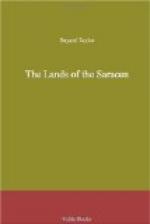Passing through a gateway of rock, so narrow that we were often obliged to ride in the bed of the stream, we reached a little meadow, beyond which was a small hamlet, almost hidden in the leaves. Here the mountains again approached each other, and from the side of that on the right hand, the main body of the Barrada, or Pharpar, gushed forth in one full stream. The fountain is nearly double the volume of that of the Jordan at Banias, and much more beautiful. The foundations of an ancient building, probably a temple, overhang it, and tall poplars and sycamores cover it with impenetrable shade. From the low aperture, where it bursts into the light, its waters, white with foam, bound away flashing in the chance rays of sunshine, until they are lost to sight in the dense, dark foliage. We sat an hour on the ruined walls, listening to the roar and rush of the flood, and enjoying the shade of the walnuts and sycamores. Soon after leaving, our path crossed a small stream, which comes down to the Barrada from the upper valleys of the Anti-Lebanon, and entered a wild pass, faced with cliffs of perpendicular rock. An old bridge, of one arch, spanned the chasm, out of which we climbed to a tract of high meadow land. In the pass there were some fragments of ancient columns, traces of an aqueduct, and inscriptions on the rocks, among which Mr. H. found the name of Antoninus. The place is not mentioned in any book of travel I have seen, as it is not on the usual road from Damascus to Baalbec.
As we were emerging from the pass, we saw a company of twelve armed men seated in the grass, near the roadside. They were wild-looking characters, and eyed us somewhat sharply as we passed. We greeted them with the usual “salaam aleikoom!” which they did not return. The same evening, as we encamped at the village of Zebdeni, about three hours further up the valley, we were startled by a great noise and outcry, with the firing of pistols. It happened, as we learned on inquiring the cause of all this confusion, that the men we saw in the pass were rebel Druses, who were then lying in wait for the Shekh of Zebdeni, whom, with his son, they had taken captive soon after we passed. The news had by some means been conveyed to the village, and a company of about two hundred persons was then marching out to the rescue. The noise they made was probably to give the Druses intimation of their coming, and thus avoid a fight. I do not believe that any of the mountaineers of Lebanon would willingly take part against the Druses, who, in fact, are not fighting so much against the institution of the conscription law, as its abuse. The law ordains that the conscript shall serve for five years; but since its establishment, as I have been informed, there has not been a single instance of discharge. It amounts, therefore, to lifelong servitude, and there is little wonder that these independent sons of the mountains, as well as the tribes inhabiting the Syrian Desert, should rebel rather than submit.




